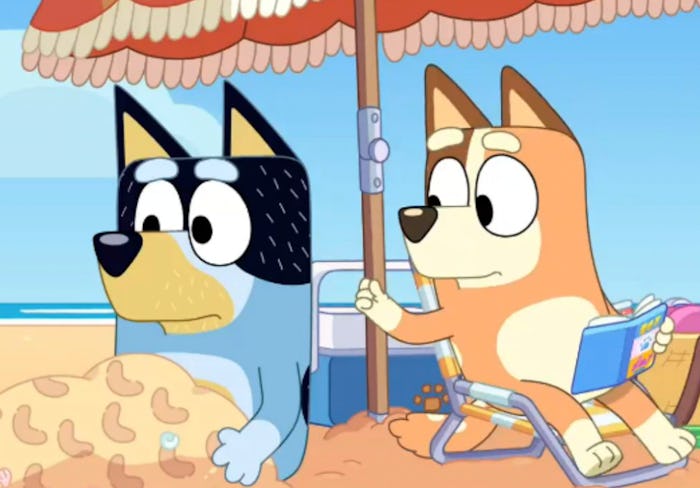been there, buddy
Why Is Bandit Upset In “Stickbird?” Fans Have Questions About The New Bluey Episode
And Bluey creator Joe Brumm has answers.
Wackadoo! 10 new Bluey episodes landed on Disney+ today, and Bluey fandom is buzzing a little harder than usual. There are plenty of laughs to be had in the new episode drop, but there’s also a more melancholic tone at play that has fans wondering if the beloved Heeler dad, Bandit, might be upset, sad or maybe even depressed. There are signs that he’s going through something in “TV Shop” and “Exercise” but “Stickbird” is the new Bluey episode where the fact that Bandit’s struggling is undeniably front and center.
The Heelers appear to still be on vacation — viewers might recognize Chilli’s beach chair and hat from “Relax” — and the kids are playing on the beach. They run up to their parents, and Chilli jumps into a game with them. Meanwhile Bandit, who sits buried in a mermaid tail of sand under a nice beach umbrella (objectively delightful), is lost in thought and even seems sad, a striking change from his usual boisterous, playful self.
“Let it go, babe. You’re missing all this,” Chilli urges gently, as she gets up to play with the girls.
“I’m trying,” he says, prying himself up to follow Bingo. Little by little, he tries to engage. He and Bingo find a stick shaped like a bird and build a sand creation around the “stickbird.” Sometimes he succeeds in being present with Bingo. But soon enough he’s staring out at the sea again. It’s not until another kid runs down the beach and takes the stickbird that Bandit and Bingo’s feelings appear fully in sync, both now huddled together under a cloud of sadness.
“I really liked Stickbird,” Bingo says.
“Yeah me too. But, when you put something beautiful out into the world, it’s no longer yours, really,” Bandit replies, speaking perhaps to his own problem as well as hers.
They walk along the beach, and Bandit tries to perk her up by finding other interesting sticks. When she rejects a stick, he says “come on Bingo, you’re missing all this,” just as Chilli said to him. Bluey runs up to them, bursting with fun and eager to share a game she’s invented, but Bingo’s not having it. “I’m upset and angry,” she says, perhaps giving us a clue about Bandit’s feelings, too.
“I can show you a trick! It’s for after you’re upset and angry.” Bluey pantomimes collecting all of the “upset and angry” that’s stashed in and around your body. “Now you’ve got all that upset and angry in your hands!” she tells Bingo.
“What do I do with it?”
“Well, do you want to keep it?”
“No, I don’t want it.”
“What do you do with something you don’t want anymore?”
Bingo, Bluey and Bandit walk to the shoreline and throw Bingo’s sadness out to sea. Happy again, the girls run back to their mom. “I’ll give you a head start!” calls Bandit, who turns to the waves as the girls run off. His expression changes — we see the amorphous upset cloud his face again now that he’s alone. As Bingo did, he pretends to gather the “upset and angry” from around his body, and sure enough, casts it out into the sea. Bandit seems happy again, as Ode To Joy plays in the background. Whatever he was going through, it seems that — with the help of his girls — Bandit is coming out the other side.
Why is Bandit upset or depressed in “Stickbird?”
What exactly is at the heart of Bandit’s blue mood is never explained, though it’s extremely clear he’s not his usual self. Does he perhaps struggle with depression? Or a midlife crisis? Maybe something happened in his life that didn’t go the way he wanted it to? The opaque nature of Bandit’s struggle is intentional, it turns out. On the Australian Broadcasting Corporation’s Behind Bluey podcast, Bluey creator Joe Brumm said that many people who work on the show wanted to know what exactly was bothering Bandit in “Stickbird,” but that the “what” is beside the point. “Bandit; there’s something on his mind in this episode, but it’s not important what it is. Take your pick! It could be a health thing, a work thing, a relationship thing, something with the kids,” Brumm explained. “It was more about not even solving what his issue is, but at least stopping the rumination. So much of Bluey is about the parents being inspired by their kids’ lack of ability to ruminate.” The point isn’t what Bandit’s upset about, but rather the way that parents can all relate to being stuck spinning on something stressful, and having your children rescue you from the hamster wheel.
Brumm went on to explain that in fact, Bandit’s arc in “Stickbird” is pulled from his own life and experience as the creator Bluey. Speaking directly to Bandit’s line: “when you put something beautiful out into the world, it’s no longer yours, really,” Brumm explained that “that line happened right at a time when, with Bluey, I was getting a lot of notes about particular episodes, and I was finding it a little difficult to really do what I wanted to do. Eventually, that mindset was the only thing that helped me. Once I make it — and I try to make it as beautiful as I can — it doesn't then belong to me...some episodes work for some people, some don't. You kind of have to detach from all that. Yeah, that one worked its way into the cartoon.”
This article was originally published on
